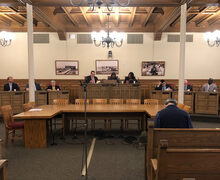Opinion: Trump defies democracy by crowning himself king online
Flynn Ledoux | Illustration Editor
Recent SAVE Act, Jan. 6 pardons and intention to purge government agencies unveil President Trump as a developing monarch. Our columnist details the danger of disguising suppression as reform.
Get the latest Syracuse news delivered right to your inbox.
Subscribe to our newsletter here.
The photo struck me like a jolt of electricity. Edited onto the Manhattan skyline with a golden crown resting atop his unmistakable hair, President Donald Trump was depicted above the words: “Long Live The King.”
It wasn’t satire. It wasn’t a meme made by a critic. It was real — posted by Trump himself on Truth Social and, even more chillingly, shared by the official White House X account on Wednesday.
For years, political analysts and concerned citizens warned about Trump’s authoritarian leanings. Some dismissed these fears as alarmist. Others pointed to the constraints of democracy and argued American institutions were too strong to be undermined by one man.
But when the man in question no longer hides his intent and openly declares himself a king while holding the highest position of power in the United States, we enter a dangerous reality.
This isn’t a symbolic gesture, but indeed a deliberate sentiment. And if history has taught us anything, we should believe what we see when authoritarian leaders reveal their true selves.
This post by Trump isn’t an isolated incident. It’s the culmination of a presidency — and post-presidency — defined by a relentless push toward absolute power in a political system built to prevent exactly that.
Consider his executive orders that sought to bypass Congress, his rhetoric labelling the press an “enemy of the people” and his refusal to accept the results of an election. These weren’t the actions of a traditional leader — they were the blueprint of a strongman consolidating control.
During his first presidency, Trump made it clear that he viewed executive power as limitless. This time, he’s further developed this notion by issuing an unprecedented number of executive orders, many of which directly contradict legal precedent or challenge the authority of coequal branches of our government.

Cole Ross | Digital Design Director
From his 2017 travel ban targeting Muslim-majority countries to his 2020 crackdown on protestors under the guise of “law and order” to his recent run of demands, Trump has consistently wielded executive power not as a tool of governance but as a weapon of dominance.
Then came Jan. 6, 2021 — a moment in American history that should have been the stopping point of Trump’s political career. The sitting president incited an attack on his own government, encouraging his supporters to “fight like hell” to overturn the results of a democratic election.
And yet, despite the violence, destruction and deaths, he faced no real consequences as he now sits in office. Instead, he has continued to cultivate the belief that he was the rightful ruler of the U.S. while pardoning the participants that were charged for the riot.
With this singular image, he’s removed the veil entirely. Trump is showing us he doesn’t want to be a president. He wants to be a monarch.
As Trump’s authoritarian tendencies become more overt, so do the policies that seek to undermine democratic participation. The recently introduced Safeguard American Voter Eligibility Act is a prime example. This legislation mandates people to provide documentary proof of U.S. citizenship, like a passport or birth certificate, when registering to vote in federal elections.
While proponents claim it’ll prevent voter fraud, the reality is far more sinister. The act disproportionately impacts misrepresented groups that include the elderly, immigrants, low-income voters and women — particularly married women who’ve changed their names and may not have easy access to updated documents.
It threatens to undo progress made since the passage of the 19th Amendment, dragging us back to an era when voter suppression was an accepted norm.
By complicating voter registration, eliminating mail-in and online registration options and necessitating in-person submissions, the SAVE Act erects new barriers to the ballot box. It’s not about security — it’s about control, ensuring only Trump’s preferred Americans can exercise their right to vote while the rest of us are systematically pushed to the margins. This is voter suppression disguised as reform.
For those who’ve spent years excusing Trump’s rhetoric as straightforward outspokenness, now’s the time to wake up.
This online declaration of kingship should send shivers down the spine of every American who believes in democracy. History has shown us democracies don’t fall all at once; they erode piece by piece until the final blow is struck.
We’re dangerously close to that moment.
Trump’s increasing embrace of authoritarian language isn’t solely about ego. It’s about conditioning the American public to accept a new reality — one where the leader isn’t accountable to the people, but the people are accountable to him. His rhetoric is about extended rulership now, not bipartisan elections.
The stakes have never been higher. Trump’s second term is already shaping up to be tangibly more worrisome than his first. He’s set on gutting the civil service, purging government agencies of those he deems disloyal and expanding presidential power beyond its established limits.
With each passing day, his language grows bolder and his actions more extreme.
Now is the time to realize this isn’t normal. The media must condemn these breaches, political leaders must stop downplaying it and every voter must recognize the risks involved with who our country has elected. This is no longer about policy differences or party lines — this is about whether America remains a democracy or succumbs to the rule of a man who’s openly declared himself king.
If we ignore this warning, we may wake up one day to find that the crown is no longer metaphorical.
Max Lancer is a junior majoring in chemistry, biochemistry and mathematics. His column appears weekly. He can be reached at mlancer@syr.edu.
Published on February 23, 2025 at 9:30 pm






